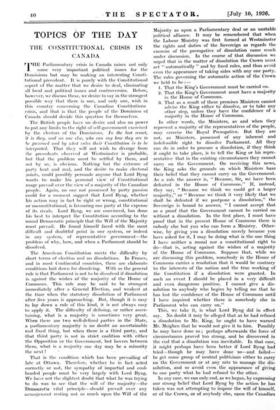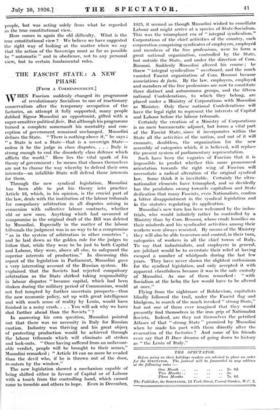TOPICS OF THE DAY
THE CONSTITUTIONAL CRISIS IN CANADA
rpm Parliamentary crisis in Canada raises not only .1_ some very important political issues for the .Dominions but may be making an interesting Consti- tutional precedent. It is purely with the Constitutional aspect of the matter that we desire to deal, eliminating all local and political issues and controversies. Before, . _ .
however, we discuss these, we desire to say in the strongest possible way that there is one, and only one, wish in this country concerning the Canadian Constitutiona crisis, and that is that the people of the Dominion of Canada should decide this question for themselves.
The British people have no desire and also no power to put any limits to. the right of self-government exercised by the electors of the Dominions. In the last resort, it is they, and no one else, who can say how they are to be governed and by what rules their Constitution is to be interpreted. That they will not wish to diverge from the precedents observed at Westminster is probable, but that the problem must be settled by them, and not by us, is obvious. Nothing but the extreme of party heat and zeal, and the desire to make electoral points, could possibly persuade anyone that Lord Byng wants to make his personal view of Constitutional usage prevail over the view of a majority of the Canadian people. Again, no one not possessed by party passion could for a moment suggest that Lord Byng, whether his action may in fact be right or wrong, constitutional or unconstitutional, is favouring one party at the expense of its rivals. Lord Byng, we are convinced, has done his best to interpret the Constitution according to the sound Democratic principle that the Will of the Majority must prevail. He found himself faced with the most difficult and doubtful point in our system, or indeed in any system, of representative government—the problem of why, how, and when a Parliament Should be dissolved.
The American Constitution meets the difficulty by short terms of election and no dissolutions. In France, and in most Continental countries, there are elaborate conditions laid down for dissolving. With us the general rule is that Parliament is not to be dissolved if dissolution is against the wishes of the majority of the House of Commons. This rule may be said to be strongest immediately after a General Election, and weakest at the time when the statutory dissolution of Parliament after Ave years is approaching. But, though it is easy to lay down a rule of this kind, it is not always easy to apply it. The difficulty of defining, or rather ascer- taining, what is a majority is sometimes very great. When there are two well-defined parties in the State, a parliamentary majority is no doubt an ascertainable and fixed thing, but when there is a third party, and ‘that third party is not in Strict coalition with either the Opposition or the Government, but hovers between -them, what is a majority one day may be a minority the next !
That is the condition - which has been prevailing of :late at Ottawa: Therefore, whether ho in fact- acted .correctly or not, the sympathy of impartial and cool. headed people must be very largely with Lord Byng. We haTe not the slightest doubt.that what he was trying to do was to see that the will of the majority—the -Democratic vital principle—should prevail over any arrangement resting not so much upon the Will of the
_
Majority as upon a Parliamentary deal or an unstable political alliance. It may be remembered that when the Labour Ministry was first formed at Westminster the rights and duties of the Sovereign as regards the exercise of the prerogative of dissolution came much under discussion. In the course of that discussion we urged that in the matter of dissolution the Crown must act " automatically " and by fixed rules, and thus avoid even the appearance of taking sides with any one party. The rules governing the automatic action of the Crown we held to be :- 1. That the King's Government must be carried on.
2. That the King's Government must have a majority in the House of Commons.
3. That as a result of these premises Ministers cannot advise the King either to dissolve, or to take any other step, unless they have the confidence of a majority in the House of Commons.
In other words, the Ministers, as and when they represent a majority of the representatives of the people, may exercise the Royal Prerogative. But they are not, as Ministers, possessed of any inherent and indefeasible right to dissolve Parliament. All they can do in order to procure a dissolution, if-they think it ought to take place, is to tell the King or his repre- sentative that in the existing circumstances they cannot carry on the Government. On receiving this news, the King asks the grounds on which Ministers base their belief that they cannot carry on the Government.
As a rule the answer is, "Because, Sir, we have been defeated in the House of Commons." If, instead, they say, "Because we think we could get a larger majority," or "Because we think it very likely that we shall be defeated if we postpone a dissolution," the Sovereign is bound to answer, "I cannot accept that as a proof that the Government cannot be carried on without a dissolution. In the first place, I must have proof that in the present House of Commons there is nobody else but you who can form a Ministry. Other- wise, by giving you a dissolution merely because you have asked for it, I may be doing what is the one thing I have neither a moral nor a constitutional right to do—that is, acting against the wishes of a majority of the House of Commons. Suppose that, while we are discussing this problem, somebody in the House of Commons carries a resolution that it would be contrary to the interests of the nation and the true working of the Constitution if a dissolution were granted. In such an event I should be placed in a very 'difficult and even dangerous position. I cannot give a dis- solution to anybody who begins by telling me that he has lost the confidence of the House of Commons until I have inquired whether there is somebody else in Parliament who can carry on." This, we take it, is what Lord Byng did in effect say. No doubt it may be alleged that as he had refused a dissolution to Mr. King, he ought to have warned Mr. Meighen that he would not give it to him. Possibly he may have done so ; perhaps afterwards the force of circumstances proved too strong, and he discovered in the end that a dissolution waS inevitable.- In that ease, it might perhaps have been better if Lord Byng had tried—though he may -.have done -so--and failed— to get some group of neutral. politicians either to carry on the Government or at any rat to manage the dis- solution, and so avoid even the appearance of giving to one party what he had refused- to the other.
In any case, we can only, end, as we began, by expressing our strong belief that Lord Byng by the action he has taken was not attempting to impose the will Of himself, or of the Crown, or of anybody else, upon the Canadian people, but was acting solely from what he regarded as the true constitutional view. .
Here comes in again the old difficulty. What is the true constitutional view ? - We believe we have suggested the right way of looking at the matter when we say that the action of the Sovereign must as far as possible be automatic !' and in obedience, not to any. personal view, but to certain fundamental rules.











































 Previous page
Previous page